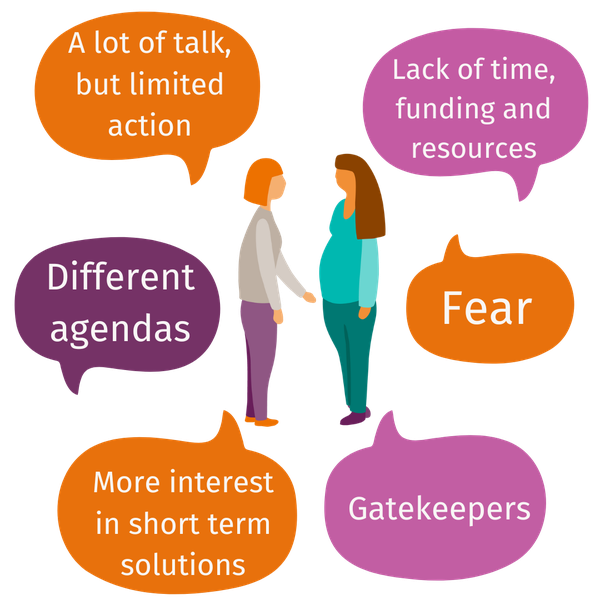This section of the Amplifying Maternal Voices Toolkit explores how different groups and organisations can work together to create change in perinatal mental health care in their local area. Ideas here may be useful for individuals interested in starting/joining a campaign group, establishing partnerships or hoping to engage new people in an inclusive, supportive way.
The following themes came up in various conversations and sessions with MMHA lived experience champions, local contacts and members:

For example, Maternity Voices Partnerships and Healthwatch. See Making connections section for further details.
When approached in a meaningful way, partnership working can be very effective.
Working on the Motability project was a genuine partnership and enabled different voices to be heard and, just as importantly, valued both emotionally and financially. All partners felt listened to and the varying methods of involvement meant the final approach was inclusive. Being part of the project from the thinking stage through to delivery and the dissemination was a true example of best practice.
Karen Wint, Sister Circle
Sister Circle is a charity putting women’s health first. They support women in challenging circumstances to empower themselves and lead healthy lives through advocacy and peer support. They build relationships with women who are isolated and find themselves in unfamiliar circumstances and create communities of support. They put women’s health and compassion at the heart of everything they do, so that all women can seek better health for themselves.
More specifically, when women face barriers to accessing healthcare in their pregnancy it can lead to negative health outcomes for the mother and the baby. Sister Circle’s Maternity Mates (programme) are a supporting hand to women through their pregnancy journey and their baby’s early years.
Visit sistercircle.org.ukJourney of ASAM (Association of South Asian Midwives)
“ASAM registered as a Community Interest Company in 2020. It was not an easy journey especially for three midwives with little or no experience in setting up a company. We want to be able to support those who wish to set up similar organisations/community interest companies."
Fatimah Mohamied, ASAM (Association of South Asian Midwives) Cultural Safety Book Club, says:
"As more awareness has been garnered from the rising rates of health inequalities among marginalised populations, a need for change on a systemic level is certainly required. However, on an individual basis, a personalized journey to understanding the shoes we walk in is also necessary, in order to understand the shoes that others walk their own convoluted lives with. The Cultural Safety Book Club is a means to enable this journey, by sharing perspectives, provoking thought and reflecting upon the intersections of healthcare with wider social and political nuances.
"The book club consists of discussing one chapter, or part of a chapter each week during term time through a theme. This enables more extrapolation from the text while allowing for flexibility; it is not necessary to attend each session, nor is it necessary to read the chapter, though it adds greatly to the experience. Themes already discussed include Community, Masculinity, Grief, Instinct, Trauma and Honour.
"The most recent season of book club finished with success framed within a context of participants learning from one another and building a sense of community with our difference marked as a strength and not a hindrance. The book chosen was “The Fortune Men” by Nadia Mohamed, which is a fictionalised account of real and heavily researched events surrounding the false conviction and execution in 1952 of the last man in Wales to be hanged. His name was Mahmoud Mattan and he was a Black Somali Muslim man. The book has been shortlisted for the Booker prize while winning numerous others and has been consequential in the South Wales Police apology for the hanging that occurred 70 years prior.”
If the content of these videos causes you to think of anything that has happened to you or someone you know and you feel upset, worried or uncomfortable, please see our support page for a list of services who may be able to help.
For example, venue hire, policies etc.
Have courageous conversations!
Rromote work and events of other local organisations.
Please note the MMHA is not responsible for the content of external sites.
Explore the other sections, or head back to the Toolkit landing page.
Understand how groups and organisations can demonstrate the impact of local initiatives. Ideas here may be useful for those seeking funding or to highlight gaps in current perinatal mental health services.
Explore ways to connect with local organisations and advocate for positive changes in perinatal mental health services. Find examples and ideas for local groups and individuals looking to collaborate and influence their local landscape.
Learn how to share stories about perinatal mental health in a safe way. Ideas here may be useful to local groups engaging those with lived/living experience, as well as for people with lived/living experience wanting to tell their stories safely.

This toolkit offers creative ideas and practical tools to empower individuals in shaping perinatal mental health care at the local level.